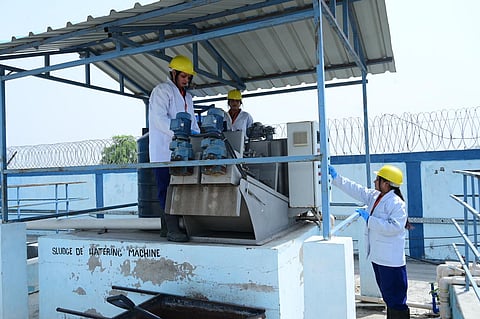Women breaking barriers: SHGs lead operations at faecal sludge treatment plants in Uttar Pradesh
“No one believed that we could do this job. Many used to say that we would only be able to continue our work at the faecal sludge treatment plant (FSTP) for a couple of days before we would finally leave,” shares Aparna Sahu, a supervisor at the FSTP in Jaunpur, Uttar Pradesh.
Aparna belongs to a lower-middle-class family; her father supplies namkeen and biscuits to local shops. After completing her graduation in sociology in 2022, she was looking for a job. To keep herself busy and motivated, she joined a self help group (SHG) in her ward while her job search continued. It has been three years since she joined the SHG.
The lives of Aparna and three other SHG members have recently taken a new turn as they are now responsible for the operations and maintenance (O&M) of the FSTP, as per a work order issued by the local municipality — Jaunpur Nagar Palika Parishad. This came under a central government initiative, Atal Mission for Rejuvenation of Urban Transformation (AMRUT) Mitra, which is aligned with women’s empowerment.
Uttar Pradesh has a total of 59 septage treatment plants, both FSTPs and co-treatment units. Out of these, 54 are funded under the AMRUT programme. Currently, the priority for city municipalities and the state is to operate these plants regularly. While some plants have already decided to engage contractors for the O&M, others have opted to engage SHG women for this task.
As a pilot project, the Uttar Pradesh government recently engaged women SHG members through the AMRUT Mitra initiative in four 32-kilolitre-per-day FSTPs in Sitapur, Raebareli, Jaunpur, and Khurja. However, involving women in the hardcore plant operation is not easy, especially in the plants of Uttar Pradesh, which mostly use hybrid technology with electro-mechanical devices like Supervisory Control and Data Acquisition (SCADA) and screw press.
Out of the 54 AMRUT plants, 31 use screw press technology, which makes it difficult for non-experts to manage the O&M of the plant. Nevertheless, when the opportunity under the AMRUT Mitra scheme to involve women in water and sanitation activities arose, Additional Mission Director PK Srivastava of AMRUT in the state, did not hesitate to make the courageous decision, having witnessed women and transgender SHGs managing the FSTPs during an exposure visit to Odisha organised by Delhi-based think tank Centre for Science and Environment (CSE).
The engagement of SHGs under the AMRUT Mitra initiative has opened up convergence possibilities between two departments: the state AMRUT, which looks after the preparation of project proposals, approval, and fund transfers, and the State Urban Development Agency (SUDA), responsible for shortlisting and engaging the right set of women SHGs.
Meanwhile, CSE played the role of facilitator between the two and, as the official knowledge partner to the state, was responsible for providing capacity-building support. At the municipality level, the executive officer was entrusted with issuing work orders to the SHG women to operate the plant.
In each of the four plants, a team of four SHG women is responsible for the O&M. Within each team, one woman works as a supervisor, two as sanitation workers and one as a gardener. The honourarium for the supervisor is around Rs 12,000, and for the others, it is around Rs 10,000, considering 27 working days in a month. The government directly transfers the honourarium to the women’s bank accounts.
The AMRUT Mitra scheme was launched in March this year across all states. The government of Uttar Pradesh has implemented a total of 87 projects, costing Rs 7,94,70,960 and involving 804 women. Out of these 87 projects, only four are related to the management of FSTPs; the rest are related to drinking water testing.
Srivastava noted that, after Odisha, Uttar Pradesh is the only other state to have engaged SHG women in the O&M of septage treatment plants under the AMRUT Mitra initiative. The government believes that the SHGs are capable of handling the O&M issues in the plants and is currently exploring the possibility of engaging more women SHGs in this role.
Selecting appropriate women and building their capacity to deliver the job are two critical factors for making this initiative sustainable. A few of the women currently engaged in the plants are illiterate, which poses a barrier to capacity building. Therefore, proper selection of women by the SUDA is crucial for plant operation.
CSE officials have already provided one round of training to the SHGs and are planning more rounds soon. City authorities in all four cities have allocated officials to support the women in running the plants daily until they are self-reliant.
Becoming inclusive is a significant achievement, especially when a government programme demonstrates it. Women are the most adversely affected by poor water and sanitation management. The government is trying to make the sector inclusive by involving women in various stages of water and sanitation management. The country has seen all-women crews flying flights, and now people in Uttar Pradesh are witnessing women managing FSTPs.

